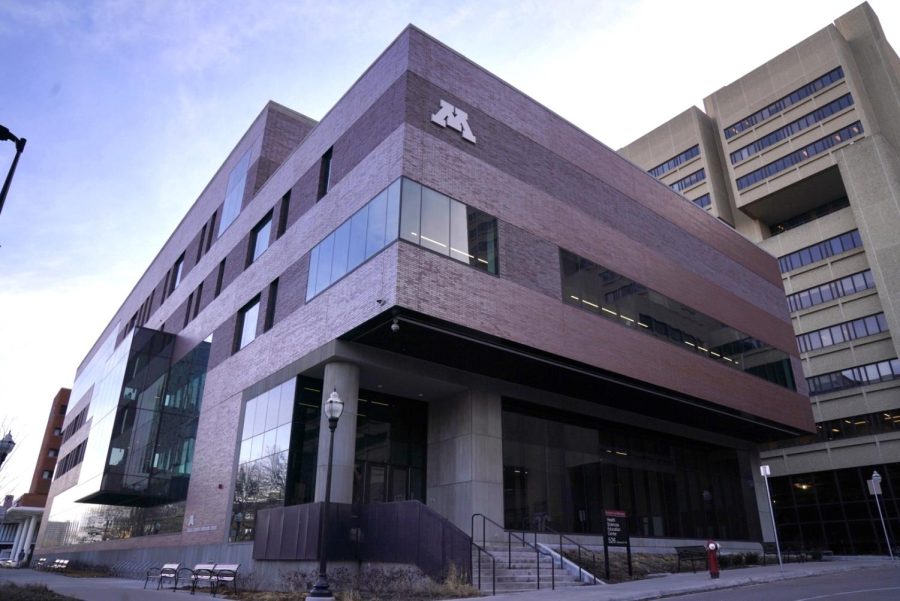The University of Minnesota is asking the state legislature for more than $150 million in May to fund the design and construction of two academic health centers, one in Duluth and the other in Minneapolis.
The two projects were presented at the March 11 Board of Regents meeting and aim to expand healthcare jobs and delivery throughout the state. Both projects are contingent on receiving funding from the state.
Investing in these centers may help reduce healthcare inequity throughout the state by providing more jobs in healthcare and expanding healthcare services in rural Minnesota, said Myron Frans, senior vice president of finance and operations. Frans said healthcare inequity was exacerbated during the COVID-19 pandemic, especially for people of color and people in rural Minnesota.
“They’ve been there, but I think we’ve seen them a little clearer,” Frans said. “We feel a strong need as a land-grant institution to make sure we provide top healthcare for everybody in Minnesota.”
The University system trains about 70% of healthcare professionals in Minnesota. These centers could expand healthcare services throughout the state and help retain more high-quality healthcare professionals in Minnesota, Frans said.
Academic Health Center
The Academic Health Center would be located in downtown Duluth in the Duluth Medical District near two existing medical centers, Essentia Health and St. Luke’s Hospital.
The center would collaborate with the two medical centers to expand healthcare training in the region. This expanded training would include individuals who are historically underrepresented in the healthcare field, said Medical School spokesperson Kat Dodge in an email to the Minnesota Daily.
The center would also include new space for classrooms and specialty labs.
The University is requesting $12 million from the state to fund the design of the building and plans to provide an additional $6 million from its own funds. This funding would be used to design what the inside of the building should consist of and how the center should interact with surrounding healthcare facilities, Frans said.
If the state approves the design funding at the 2022 legislative session in May, then the University will ask for additional funding for construction. Frans said the University is estimating the total construction cost would be around $162 million, bringing the total cost to about $180 million.
Typically, the University pays one-third of the total cost of a building and the state will fund the other two-thirds. Determining this total cost will be a “few years down the road,” Frans said.
The University does not yet own the property for this building, but is looking at available land in the Duluth Medical District, Frans said.
“If we get the money, then we’ll decide where we should put it within the Duluth Medical District,” Frans said.
If the state approves the funding, it would take nearly four years to complete the design and construction, according to the meeting docket.
Health Discovery Hub
The Health Discovery Hub would be located on the East Bank of the Minneapolis campus. The hub would allow the University to expand patient-centered clinical research trials as well as its network for rural health research. The University would also be able to provide space for a reimagined medical device center, according to the Medical School statement.
The University is asking the state for $140 million in funding and plans to invest $70 million of its own funds for the design and construction of the facility. The University already owns the land for the hub, Frans said.
The hub would correspond with the existing Health Sciences Education Center, which opened in 2020. Both buildings were recommended by the 2015 Governor’s Blue Ribbon Commission.
The hub is currently in the pre-design phase, and If the state approves the funding, it would take more than three years to complete the hub’s construction, according to the meeting docket.
For both of these projects, the University plans to use the sale of bonds to fund its portions of the funding for the centers, Frans said.
Regent Doug Huebsch said he supports investing in these health centers because of the University’s mission to support Minnesota and its residents.
“Healthcare applies to every single one of us,” Huebsch said. “I think everybody wants to buy into having great healthcare in their backyard.”
Minnesota is also known as a great healthcare state with many jobs in the industry, according to Huebsch. Investing in these centers will create more jobs in the future and give the state an opportunity for economic development, he said.
“We’ve always had good healthcare, but if we’re not investing actively and really working on it, we’re going to fall behind,” Huebsch said. “Everybody wants good healthcare, and so this is going to help us over the long term.”
Image by Andrew Stoup
The University of Minnesota’s Health Sciences Education Center on Friday, March 18. The Board of Regents are looking at plans to make a new Health Sciences Center on East Bank Campus.
UMN requests $150 million from state legislature to build healthcare centers on Twin Cities and Duluth campuses
The two academic health science facilities would aim to expand high-quality healthcare throughout the state.
by Maia Irvin
Published March 31, 2022
0
More to Discover



















